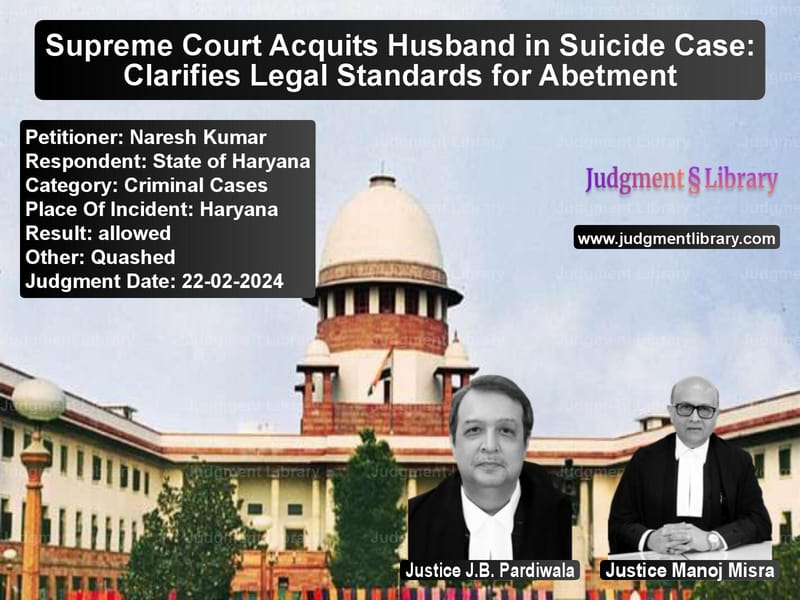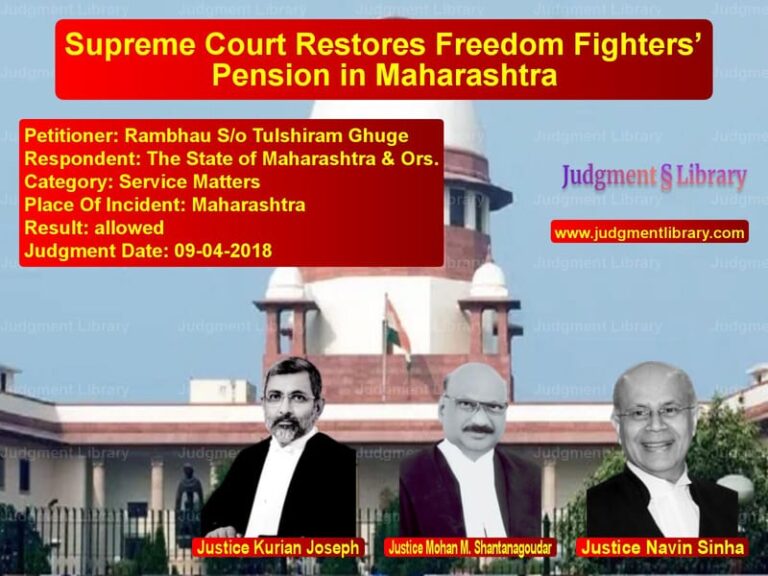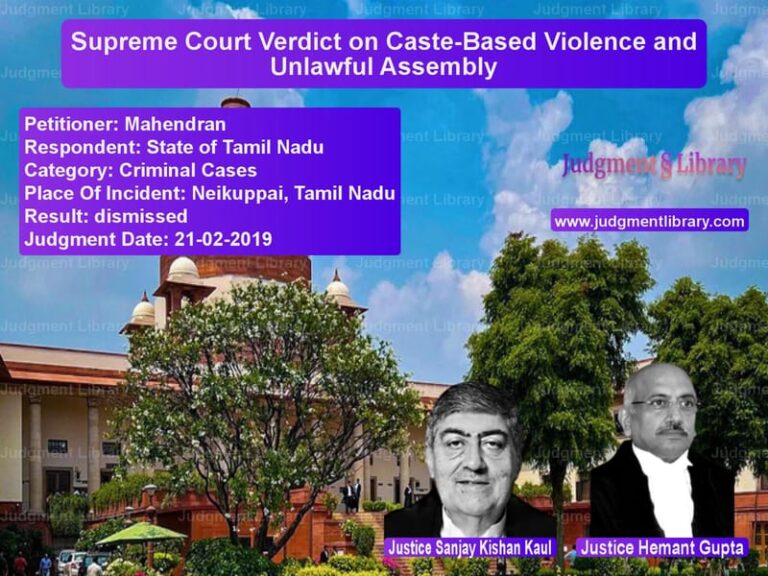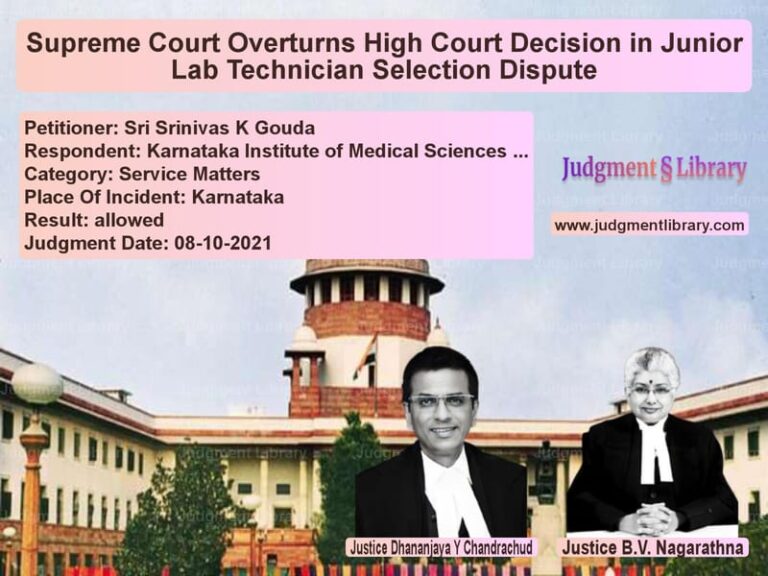Supreme Court Acquits Husband in Suicide Case: Clarifies Legal Standards for Abetment
The Supreme Court, in Naresh Kumar v. State of Haryana, set aside the conviction of the appellant under Section 306 IPC (abetment of suicide). The Court ruled that mere demand of money from the wife’s family and her general state of tension do not amount to abetment unless there is clear evidence of instigation or harassment. This judgment provides much-needed clarity on the legal standard for abetment of suicide cases.
Background of the Case
The case arose from the tragic death of Rani, who was married to the appellant Naresh Kumar on May 10, 1992. Rani died by suicide on November 19, 1993, allegedly due to harassment by her husband for financial assistance to start a business. The prosecution claimed:
- Rani’s husband and in-laws demanded Rs. 50,000 for setting up a ration shop.
- Rani’s family could not arrange the amount, but they helped Naresh open a shop in their village.
- Naresh shut the shop and moved to Delhi, taking Rani with him.
- A few days before her death, Naresh and Rani visited her family, and Naresh demanded Rs. 20,000.
- Two days later, Rani consumed poison and died.
Naresh Kumar was convicted under Section 306 IPC by the Additional Sessions Judge, Karnal, in 1998. The Punjab and Haryana High Court upheld the conviction in 2008, leading to the present appeal before the Supreme Court.
Petitioner’s Arguments
The appellant, Naresh Kumar, challenged his conviction, arguing that:
- There was no direct evidence of harassment or cruelty that could have driven Rani to commit suicide.
- The prosecution failed to prove an active act of instigation by the husband.
- The demand for money alone does not constitute abetment of suicide.
- The lower courts wrongly relied on Section 113A of the Evidence Act without substantive proof of harassment.
Respondent’s Arguments
The State of Haryana, represented by its counsel, argued:
- The suicide took place within seven years of marriage, triggering the presumption under Section 113A of the Evidence Act.
- Eyewitnesses (Rani’s father and brother) testified about the demands for money.
- The deceased was under mental stress due to constant financial demands.
- Even if there was no physical violence, the psychological pressure exerted on the deceased led to suicide.
Supreme Court’s Observations
The Supreme Court, led by Justices J.B. Pardiwala and Manoj Misra, analyzed the case and found significant gaps in the prosecution’s evidence:
- “Mere demand of money for starting a business, without coercion or cruelty, does not amount to abetment.”
- “There is no evidence of direct incitement or a proximate cause that led the deceased to take her own life.”
- “To constitute abetment under Section 306 IPC, there must be a clear act of instigation, conspiracy, or intentional aid.”
- “A general state of tension does not satisfy the legal test for abetment unless accompanied by persistent and unbearable harassment.”
Legal Analysis
The Court extensively discussed the legal requirements for abetment under Section 306 IPC and how they must be satisfied:
Section 306 IPC: Abetment of Suicide
Section 306 states:
“If any person commits suicide, whoever abets the commission of such suicide, shall be punished with imprisonment which may extend to ten years, and shall also be liable to fine.”
For a conviction under this provision, the following elements must be proven:
- A suicide must have occurred.
- The accused must have instigated, conspired, or intentionally aided the act.
- The accused’s actions must have been a direct or proximate cause of the suicide.
Interpretation of Abetment
Section 107 IPC defines abetment as:
- Instigation to commit a crime.
- Engaging in a conspiracy to commit the act.
- Intentional aiding by an act or illegal omission.
The Court reiterated that passive conduct or mere demands do not amount to abetment unless there is clear evidence of coercion.
Presumption under Section 113A of the Evidence Act
Section 113A allows the Court to presume abetment if a married woman dies by suicide within seven years of marriage and was subjected to cruelty.
However, the Supreme Court clarified:
- “The presumption under Section 113A is discretionary, not mandatory.”
- “The prosecution must show substantive evidence of cruelty beyond mere financial demands.”
- “General discord in marriage is insufficient to convict someone of abetment of suicide.”
Final Verdict
The Supreme Court allowed the appeal and acquitted Naresh Kumar, ruling:
“The conviction under Section 306 IPC is unsustainable in law as the prosecution has failed to prove the essential ingredients of abetment.”
The Court further observed:
- “Criminal law must not be used to unfairly punish an accused when the legal threshold for abetment is not met.”
- “The prosecution’s reliance on a presumption under Section 113A without substantive evidence of cruelty is misplaced.”
- “A person cannot be convicted based on moral guilt alone; the charge must be proven beyond a reasonable doubt.”
Key Takeaways from the Judgment
This judgment provides important legal clarity:
- Abetment of suicide requires clear proof of instigation or coercion.
- Financial demands alone do not constitute abetment.
- The presumption under Section 113A of the Evidence Act is discretionary and must be backed by substantive evidence.
- Courts must distinguish between general marital discord and legally actionable cruelty.
Impact of the Judgment
The ruling has far-reaching implications:
- Strengthens safeguards against wrongful convictions under Section 306 IPC.
- Ensures a higher threshold of proof in cases of alleged abetment of suicide.
- Prevents misuse of criminal law in matrimonial disputes.
- Reinforces the principle that guilt must be established beyond a reasonable doubt.
Conclusion
The Supreme Court’s decision in Naresh Kumar v. State of Haryana serves as a landmark ruling in defining the legal standards for abetment of suicide. By acquitting the accused due to lack of sufficient evidence, the Court has upheld the principles of fair trial and due process. This case will serve as a precedent in future cases where mere allegations without substantive proof are used to prosecute individuals under Section 306 IPC.
Petitioner Name: Naresh Kumar.Respondent Name: State of Haryana.Judgment By: Justice J.B. Pardiwala, Justice Manoj Misra.Place Of Incident: Haryana.Judgment Date: 22-02-2024.
Don’t miss out on the full details! Download the complete judgment in PDF format below and gain valuable insights instantly!
Download Judgment: naresh-kumar-vs-state-of-haryana-supreme-court-of-india-judgment-dated-22-02-2024.pdf
Directly Download Judgment: Directly download this Judgment
See all petitions in Suicide Cases
See all petitions in Judgment by J.B. Pardiwala
See all petitions in Judgment by Manoj Misra
See all petitions in allowed
See all petitions in Quashed
See all petitions in supreme court of India judgments February 2024
See all petitions in 2024 judgments
See all posts in Criminal Cases Category
See all allowed petitions in Criminal Cases Category
See all Dismissed petitions in Criminal Cases Category
See all partially allowed petitions in Criminal Cases Category







